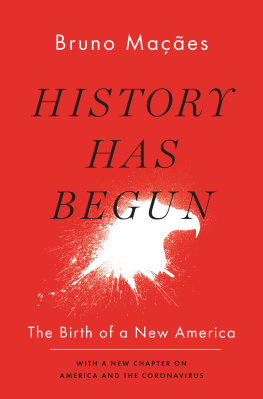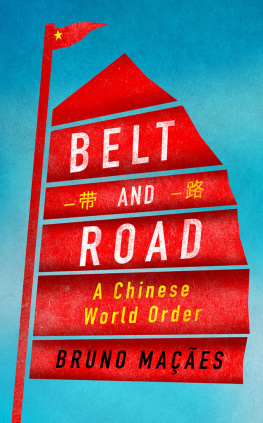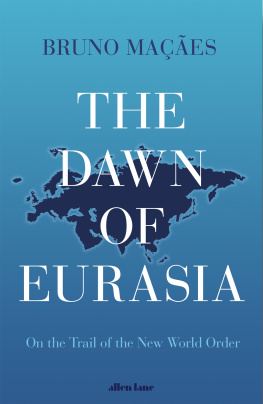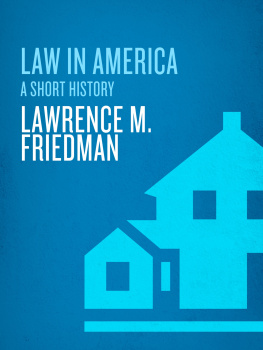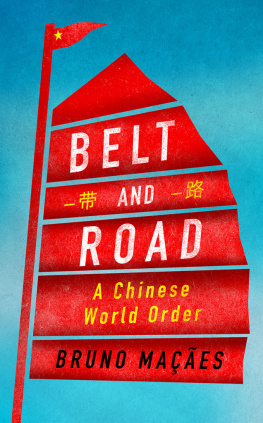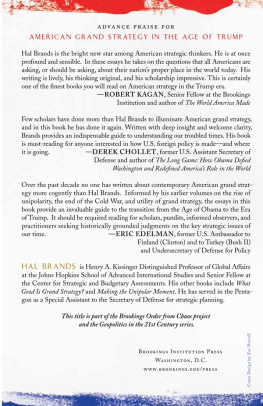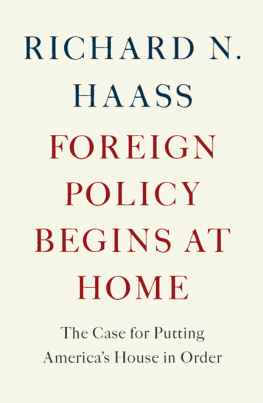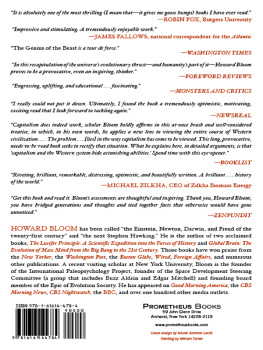HISTORY HAS BEGUN

Oxford University Press is a department of the University of Oxford. It furthers the Universitys objective of excellence in research, scholarship, and education by publishing worldwide. Oxford is a registered trade mark of Oxford University Press in the UK and in certain other countries
Published in the United States of America by Oxford University Press
198 Madison Avenue, New York, NY 10016, United States of America
Bruno Macaes 2020
Originally published by C. Hurst & Co., UK
All rights reserved. No part of this publication may be reproduced, stored in a retrieval system, or transmitted, in any form or by any means, without the prior permission in writing of Oxford University Press, or as expressly permitted by law, by license, or under terms agreed with the appropriate reproduction rights organization. Inquiries concerning reproduction outside the scope of the above should be sent to the Rights Department, Oxford University Press, at the address above.
You must not circulate this work in any other form and you must impose this same condition on any acquirer
Library of Congress Control Number: 2020940549
ISBN: 9780197528341
eISBN: 9780197528365
To Harvey Mansfield
When the legend becomes fact, print the legend.
The Man Who Shot Liberty Valance
Contents
We are unlearning old truths, a prelude to learning new ones. The values that have guided Western politics for decades or even centuries still seem true to most of us in the West, but they are true in a different way. They no longer seem inevitable. They may triumph in the end, but the playing field has been levelled. There are no impersonal forces pushing everyone towards the happy end of a society like those existing in North America or the European Union. In this new world, no triumph is ever definitive, which is to say that no triumph is ever a triumph.
The future is open. We are about to become the first human type to live entirely in history. Like human beings over the past three or four centuries, we live predominantly in the future and for the sake of the future. We are aware that nothing is permanent. Unlike our predecessors, we no longer believe that historical change has a meaning and direction. We are revolutionaries who have lost the faith in revolution.
For the moment, Western values seem in retreat. They are certainly not advancing, much less being irresistibly carried to every corner of the Earth. That we used to believe in their automatic expansion seems almost incredible now, but that does not mean that the situation has become hopeless. History does not take sides. It has not chosen liberal values, but neither has it chosen a new challenger. There is an implicit call here to join the battle, and that is the element in our predicament that is simultaneously unnerving and exciting.
So far the challenge to the old truths has come from the usual suspects. Almost as if the Soviet Union had never collapsed, the loudest voices in Russia continue to argue that what the West calls paradise is, when properly observed, the very idea of hell. It is a cry in the wilderness that never rises above a lonely cry because, when it comes to the decisive task of creation, Russia has failed or, at least, fallen short. Those who cannot live by the ruling values but are equally unable to produce new ones may justly be accused of having failed at the game.
China is a different case. This is a country that shows no evidence on converging with Western society on political and economic values, but whose ability to compete with the West seems undisputed. Whether the Chinese economy continues on the same path of fast growth or enters a period of malaise, few with knowledge of local realities will doubt its ability to master the sources of technological growth. It is precisely on this question that contemporary China has issued a serious challenge to liberal ideas. If China is able to demonstrate that Western society is not the only model capable of developing and controlling the key technologies of the future, global political competition will take place between different models and historical development will no longer follow a predetermined path. At that point, nothing will allow us to think that other major powers such as India cannot in the future look for their own political models in independence from existing alternatives.
I wrote about this possibility in previous books, before realizing that a much bigger question has been strangely neglected: might not the challenge to the ruling values come from inside the system rather than outside? I do not mean to say that a country such as the United States could enter a political crisis or even a process of institutional decline. That possibility is being discussed today. Many commentators see copious evidence of it and openly appeal to other societies to carry the liberal torch while Americans pass through their political distempers. But no political crisis, no matter how serious or prolonged, would provide much of a challenge to the dominant political values. In the absence of an alternative, even collapse would leave those values intact, waiting for a return or rebirth at the appropriate moment. Those who have spoken of liberal society as the final political model for mankind had their sights on the cunning of history, the influence of larger forces of which men and women may not be fully aware. There is room in this narrative for errors and catastrophes, crises and convulsions. The triumphal march of liberal democracy has been prodigal in setbacks.
For the United States to actively challenge the very values upon which it was founded, something else is needed. Not a process of collapse but an act of reinvention. I wrote in a previous book: The United States may yet reveal itself as a shape-shifter. This prodigious child of the Enlightenment might not hesitate to shed Western, liberal principles if it becomes convinced that they have been refuted by time and experience. If ever the United States becomes convinced that the West belongs to the past, it could leave Europe living in that past, but it will not be inclined to remain there itself, especially if that would entail sacrificing the thing to which it is most addicted: global primacy. If the West ever falters, America will want to become less Western. As the fulcrum of world power moves away from the West, so will America.
At first glance, it is possible to think that the country at the centre of the existing world order will also be the most conservative element in the system. It benefits from the system in greater measure and it likely has a sharper understanding of the organizing values. On the other hand, the centre of global power is free of the temptations to please and emulate. As for intuitive knowledge of the organizing values, might it not be the case that those who understand their appeal are also better positioned to discover their contradictions and to believe that they can overcome them?
In contrast to the generalized attack against liberalism being conducted in China, the reinvention happening in America is natural and spontaneous. It may be more difficult to perceive because it has evolved from within the liberal idea. Even when it departs from liberalism it does so more often than not in response to its inner limits and contradictions. If a new world is being born, it is doing so slowly and almost imperceptibly. In the game of civilization, much like in chess, one must move a piece at a time, keeping all others in place, until a new combination emerges.

